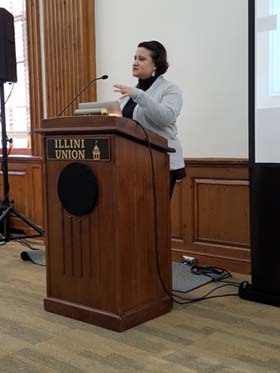How does one go from being undocumented to hyperdocumented and what are the implications of that in educational settings and beyond? On January 25, 2018, Doctora (Dra.) Aurora Chang provided insight into these inquiries by sharing how documentation has played out in her life. For her, documentation extends beyond status. Her “love of small writing acts” began by acquiring the knowledge to understand and complete paperwork as well as translating for parents at an early age. It progressed in writing 2nd-grade stories about the Guatemala she knew from familial conversations at home. It continues with bringing written words to the public by demonstrating her expertise at varied spaces, including events not always inclusive of immigration.
To convey how powerful it is to “put something in writing in all of its iterations,” Dra. Chang verbally shared written words describing the research she conducts alongside student co-researchers. Her current work stems from youth participatory action research with undocumented students pursuing studies at a community college, in which she theorizes about hyperdocumentation and undocumented intelligence. Whereas the former “refers to the excessive production of documents and texts and papers in an effort to compensate your undocumented status or any sort of unworthiness,” the latter is the “knowledge, skills, and intuition fostered by living as an undocumented person.” By teaching about her own life experiences and those of her students, she unveiled how undocumented individuals know by necessity and experience how to negotiate being visible and invisible in their journey of becoming hyperdocumented.
There are two immediate lessons and a longer-term, yet urgent, reflection to consider. The first take-away from her talk is the advice that her research team offers to educators when working with, or serving, undocumented students. Some points include:
- You don’t need to know a lot to help me
- Don’t tell me everything is going to be fine
- Walk the path alongside me
The second lesson encourages people to write their own stories, rather than allowing others to do so, because our stories are not our own. We owe it to others to share them. In publicly documenting the realm of our lived experiences, others are able to access it and find themselves in those pages, especially if they are from marginalized groups.
Questions for future reflection that arise, at least for this writer, relate to the tensions among hyperdocumentation, undocumented intelligence, the anti-immigrant rhetoric that has increased in the U.S. since the 2016 presidential election, and the danger embedded in visibility, values, and worth. I gather from the talk that in engaging in hyperdocumentation, students are able to demonstrate their undocumented intelligence. While this provides hope, control of their lives, and a sense of power, their agency resides within and around themselves, not necessarily in tangible gains toward citizenship. As such, I am left wondering if becoming hyperdocumented is a personal goal or if it is an action dependent always (even if unconsciously) on structural determinations, such as those of a college or the government? Although students do enjoy personal satisfactions, what is the danger of becoming hyperdocumented? In addition, how does undocumented intelligence reveal itself in the lives of people who are not hyperdocumented, if at all? Also, is documenting our stories useful for a particular public such as those of which we might feel a part, or can it be used against vulnerable populations despite the power of their written words? After all, Dra. Chang acknowledges that hyperdocumentation is not a remedy but rather a “temporary relief from deep-seated beliefs of unworthiness. But as participants and co-researchers have also attested to, until we go from [that] to actually documenting our lives, we’ll remain in the shadows.” That is, hyperdocumentation has to shift from individual experiences to collective, public stories that have the potential to create transformative change at structural levels so that living in the shadows ceases to exist now and in the future. Until then, “write the text you have always dreamed of reading,” because “refuge from danger can no longer lay in concealing but rather revealing [our] narratives.”
Lisa Ortiz is a doctoral candidate in education policy, organization, and leadership at the University of Illinois at Urbana-Champaign.
